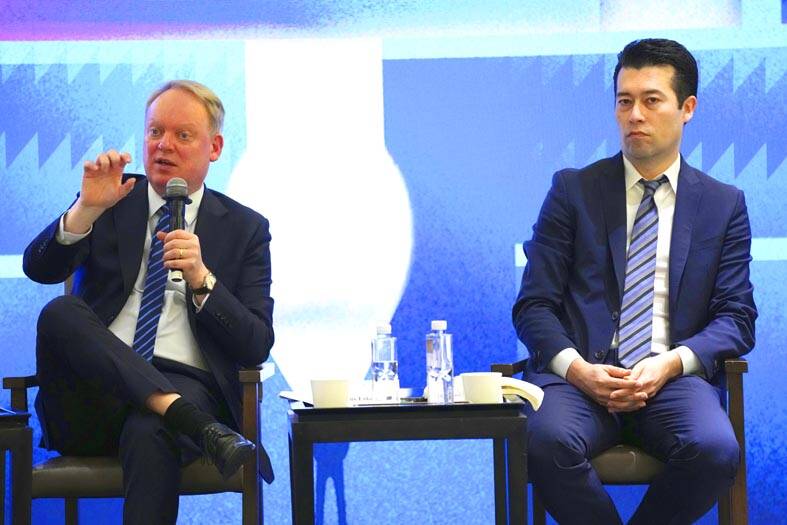European companies in China are facing “less predictable” business conditions in the world’s second-largest economy, a report said yesterday, forcing them to allocate more resources to risk management.
The study, published by the EU Chamber of Commerce in China, sheds light on the increasing challenges for foreign firms with operations in the country.
More than half of those polled — 55 percent — reported a business climate that is “more political over the past year,” according to a recent survey conducted by the chamber, which represents more than 1,700 companies in China.

Photo: AP
This “general sentiment of uncertainty” has pushed three-quarters of European companies to review their exposure to China and diversify supply chains over the past two years, the survey found.
However, only 12 percent have decided to establish completely new supply chains outside China, while just 1 percent are severing all links with the country.
The report’s highlighting of uncertainty echoes sentiments expressed in an American Chamber of Commerce (AmCham) report last month, which noted an uptick in its members’ optimism about the Chinese market, but added that US-China tensions and regulatory inconsistency were among the main challenges reported.
Most of AmCham’s members planned limited or no new investments in China this year, it said.
“Despite significant improvement compared to last year, a majority (57 percent) of companies lack confidence that China will further open its markets to foreign firms,” it said.
“With the complexity and severity of the risks that businesses face having grown exponentially in recent years, companies are now having to allocate more resources to risk management and compliance activities than ever before,” the EU report said.
To navigate those risks, investing in due diligence services and detailed supplied chain reviews could become a competitive advantage, the chamber said.
However, a recent crackdown on consulting firms operating in China has spooked foreign investors, and recent changes to an anti-espionage law give Beijing more power than ever to determine what information falls under the national security umbrella.
“Derisking” has emerged as a core pillar of the EU’s economic policy toward China, after the COVID-19 pandemic and Russia’s invasion of Ukraine, the report said.
The term contrasts with the more drastic approach known as “decoupling,” pursued by some policymakers in the US who aim to isolate China or cut all commercial ties with the country.
The EU views China as a “partner,” but also as “an economic competitor and systemic rival,” the report said.

When an apartment comes up for rent in Germany’s big cities, hundreds of prospective tenants often queue down the street to view it, but the acute shortage of affordable housing is getting scant attention ahead of today’s snap general election. “Housing is one of the main problems for people, but nobody talks about it, nobody takes it seriously,” said Andreas Ibel, president of Build Europe, an association representing housing developers. Migration and the sluggish economy top the list of voters’ concerns, but analysts say housing policy fails to break through as returns on investment take time to register, making the

‘SILVER LINING’: Although the news caused TSMC to fall on the local market, an analyst said that as tariffs are not set to go into effect until April, there is still time for negotiations US President Donald Trump on Tuesday said that he would likely impose tariffs on semiconductor, automobile and pharmaceutical imports of about 25 percent, with an announcement coming as soon as April 2 in a move that would represent a dramatic widening of the US leader’s trade war. “I probably will tell you that on April 2, but it’ll be in the neighborhood of 25 percent,” Trump told reporters at his Mar-a-Lago club when asked about his plan for auto tariffs. Asked about similar levies on pharmaceutical drugs and semiconductors, the president said that “it’ll be 25 percent and higher, and it’ll

CHIP BOOM: Revenue for the semiconductor industry is set to reach US$1 trillion by 2032, opening up opportunities for the chip pacakging and testing company, it said ASE Technology Holding Co (日月光投控), the world’s largest provider of outsourced semiconductor assembly and test (OSAT) services, yesterday launched a new advanced manufacturing facility in Penang, Malaysia, aiming to meet growing demand for emerging technologies such as generative artificial intelligence (AI) applications. The US$300 million facility is a critical step in expanding ASE’s global footprint, offering an alternative for customers from the US, Europe, Japan, South Korea and China to assemble and test chips outside of Taiwan amid efforts to diversify supply chains. The plant, the company’s fifth in Malaysia, is part of a strategic expansion plan that would more than triple

Taiwanese artificial intelligence (AI) server makers are expected to make major investments in Texas in May after US President Donald Trump’s first 100 days in office and amid his rising tariff threats, Taiwan Electrical and Electronic Manufacturers’ Association (TEEMA, 台灣電子電機公會) chairman Richard Lee (李詩欽) said yesterday. The association led a delegation of seven AI server manufacturers to Washington, as well as the US states of California, Texas and New Mexico, to discuss land and tax issues, as Taiwanese firms speed up their production plans in the US with many of them seeing Texas as their top option for investment, Lee said. The